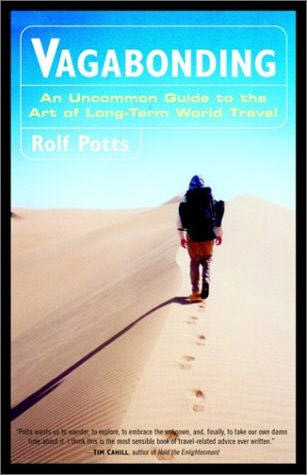Book Review: Vagabonding – By Rolf Potts
When Tim Ferriss, author of The 4-Hour Workweek, suggested I read Rolf Potts’ Vagabonding, I immediately picked up a copy… and I suggest you do too!
 The 205-page book goes into great detail on the art of long-term world travel and is not only informative, but inspiring, educational, and thought-provoking as well.
The 205-page book goes into great detail on the art of long-term world travel and is not only informative, but inspiring, educational, and thought-provoking as well.
While there is some content inside Vagabonding that discusses the basics of long-term travel (such as whether or not you should travel with a partner or how to go about planning your round-the-world adventure), most of the book is a whole lot deeper than that. Instead of covering the logistics of travel, Potts uses his own experience and the testimonial of others to suggest new ways of thinking about and carrying out your own world travels.
After reading Rolf Potts’ Vagabonding, I can honestly say that this is one book every world traveler needs to read. But Potts is quick to point out the difference between the traveler and the tourist… as this book is not intended for the later.
“The difference between looking and seeing on the road is frequently summed up with two somewhat opposable terms: tourist and traveler. According to this distinction, travelers are the ones who truly ‘see’ their surroundings, whereas tourists just superficially ‘look’ at attractions. Tourists moreover, are thought to lack depth and taste, and their pursuits are considered inauthentic and dehumanized; travelers, interested and engaged, are exactly the opposite.”
Potts then goes on to say that even though this definition of tourist and traveler has held strong for many years, there is still a problem amongst many individuals roaming the world – namely those who think they are travelers, but in reality are not.
The biggest theme I picked up from Rolf Potts’ Vagabonding is that travel should have no rules. He encourages us to slow down, see less, experience more, remain open to new opportunities, meet your neighbors, get into adventures, keep it real, be creative, and let your spirit grow.
“Just because you’re traveling doesn’t mean you must always be on the move.” Potts declares. “It’s advisable to pick an appealing place at some point in your travels and settle down for a few weeks or months to get to know it better.”
At numerous points throughout the book, Potts encourages his readers to slow down, really get to know an area, and try new things.
“How you choose to do this will depend on how you’ve already been traveling. If you’ve mainly been visiting cities, for example, perhaps it’s time to hit the countryside. If you’ve been spending most of your time in the backcountry, try a taste of city life. If you’ve been traveling alone, seek out new companions. If you’ve been traveling with a partner, split up for a while. If you haven’t done much recreation yet, rent a kayak, take an open-water scuba course, or learn how to rock climb. If all you’ve done is play, maybe it’s time to head out and wander with no particular goal in mind”
Or if all you’ve been doing is racking up miles on your bicycle, maybe it’s time to stop and do any of the aforementioned activities?
Potts goes on to say that, “One surefire method to keep travel from getting too predictable is to occasionally acquire or improvise your own transportation. In Laos, I bought a local fishing boat with some other travelers and drove it down the Mekong River for three adrenaline-filled weeks. In Burma, I bought a Chinese-made one-speed bicycle in Mandalay and pedaled it south for ten days before trading it for a fistful of pearls. In Lithuania, I stuck out my thumb on the side of the road in Vilnius, and found myself four countries away (in Hungary) three days later. In Israel, I did away with transport altogether and walked across Galilee, Jesus-style. In addition to being unforgettable experiences, each of these adventures ended up costing me next to nothing.”
And so it is that I found myself shaking my head in agreement. From my experience, far too many travelers believe that world travel is meant to be conducted in one specific way. Not only do I disagree, but I’m glad to finally hear that someone else thinks the same.
Potts’ advice throughout the book is classic and true.
My favorite part of the book, however, comes at the end when he discusses the act of returning home after a long trip around the world.
“Initially you’ll enjoy rediscovering all the little aspects of home that you missed in faraway lands; long, hot showers; the latest movies in full Dolby sound; dinner and drinks at your favorite restaurants and hangouts. But after a few days of indulgence, you’ll begin to feel a strange sensation of homesickness… for the road.”
“Your old friends will offer absolutely no help in this regard. As exciting and life-changing as your travel experiences were, your friends will rarely be able to relate, because they don’t share the values that took you out on the road in the first place. You may have shared your soul with a fellow traveler you’d known for two hours in Zambia, but for some reason you’ll be unable to get your closest friends to break out of their standard conversation patterns and take an interest in your adventures.”
And yet again I found myself agreeing with Potts. This “homesickness” for the road has hit me every single time I’ve returned from a long trip… and each and every time I struggle to find a single soul back home who understands, has an interest, or cares even the slightest bit about my travels.
Potts’ advice here is classic… but I don’t want to give it away for free. So, if you want to find out what Potts has to say when it comes to returning home from a world-wide adventure, you need up pick up his book. I highly recommend it!
For more information on Vagabonding… or to pick up a copy of the book for yourself, please click here.

